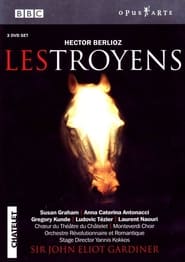detail profile nicolas test c3 a9

Info Pribadi
Peran Yang Di Mainkan Nicolas Testé
 In its most ambitious effort yet...
In its most ambitious effort yet...Metropolitan Opera At Home Gala 2020
In its most ambitious effort yet to bring the joy and artistry of opera to audiences everywhere during the Met’s closure, the company presented an unprecedented virtual At-Home Gala, featuring more than 40 leading artists performing in a live stream from their homes all around the world.
 Les Huguenots is a monumental fresco...
Les Huguenots is a monumental fresco...Opéra National de Paris: Meyerbeer's Les Huguenots 2018
Les Huguenots is a monumental fresco featuring various impossible loves in the context of the Saint Bartholomew Massacre. Andreas Kriegenburg places these timeless conflicts of love and religion in an immaculate setting in which the costumes appear yet more flamboyant and the victims’ blood more violently red.
 Bizets rarely heard opera returned to...
Bizets rarely heard opera returned to...Bizet: The Pearl Fishers 2016
Bizet’s rarely heard opera returned to the Met for the first time in a century on New Year’s Eve 2015, in Penny Woolcock’s acclaimed new production. Star soprano Diana Damrau sings Leïla, the virgin priestess at the center of the story. Matthew Polenzani and Mariusz Kwiecien are Nadir and Zurga, rivals for Leïla’s love who have sworn to renounce her to protect their friendship—and who get to sing one of opera’s most celebrated duets, “Au fond du temple saint.” Nicolas Testé is the high priest Nourabad and Gianandrea Noseda conducts Bizet’s supremely romantic score.
 Before the Trojan War Agamemnon gathered...
Before the Trojan War Agamemnon gathered...Gluck: Iphigenie en Aulide / Iphigenie en Tauride 2013
Before the Trojan War, Agamemnon gathered the Greek armies at the port of Aulis. The goddess Diane sent unfavorable winds to prevent the Greeks from sailing. Her oracle set a condition for Agamemnon: to earn the right to sail forth and destroy an innocent country, he would have to sacrifice his own daughter. Agamemnon accepted these terms and killed his young daughter Iphigénie on the altar. In his play Iphigenia in Tauris Euripides imagines that Diane plucked Iphigénie from that altar and delivered her to a temple in distant Tauride, where Iphigénie began to serve the enemy Scythians as Diane’s high priestess—all the while Iphigénie’s family believing her dead.
 This epic opera follows Virgil beginning...
This epic opera follows Virgil beginning...Berlioz: Les Troyens 2003
This epic opera follows Virgil, beginning as the Greeks appear to have ceded the field after ten years of the Trojan War. Cassandra tries to warn of the terrible fate to come, but fate is set and Troy falls. The first two acts cover this tragic end, then the flight of survivors to Carthage and events at Carthage continue in acts 3 - 5, culminating in the further voyage for Italy and Rome. This is Virgil's classic epic, in operatic form, in about a three and a half hour performance from French Opera.
